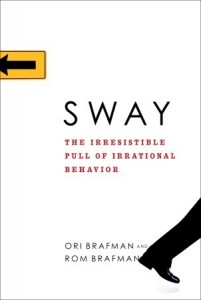 …is willing to accept that she creates her own reality except for some of the parts where she can’t help but wonder what the hell she was thinking.
…is willing to accept that she creates her own reality except for some of the parts where she can’t help but wonder what the hell she was thinking.
—Brian Andreas, Storypeople
If you ask my husband, I live most of my days on the flip side of reason.
It’s not that I don’t believe in the principles of logic, it’s just that Leslie Logic has a life-and a mind-of its own. Whether I’m squeezing a three-hour project into a 79-minute block of time, justifying that chocolate calories don’t count if they’re eaten standing up, or complaining that my back hurts as I put another three pounds of “emergency supplies” into my purse, somehow it all makes sense at the time.
Given my tendencies, it was no surprise that I was tempted to check out, Sway: The Irresistible Pull of Irrational Behavior, a recent bestseller in which authors (and brothers) Ori and Rom Brafman attempt to explore several of the psychological forces that derail rational thinking.
I always like books that make me think twice about truths I hold self-evident, and “Sway” is one of those rare books that explains the obvious in ways that are not obvious at all.
According the Brafman’s there are certain “sway factors” that influence our decision-making, including:
* “Loss aversion” – when we engage in irrational behavior when we perceive potential losses. The bigger the stakes, the higher the risks we are likely to take to avoid those losses.
Ah, like at cocktail parties, where you’re only interested in what your significant other has to say when that cute young thing is flirting with him. Or at Nordstrom, when you’re ready to walk away from those sale-priced black boots that are indistinguishable from the three pairs you have at home, but can’t live without them when another gal comes sniffing at the leather.
* “The swamp of commitment” – where past success using certain strategies reinforces the likelihood of our using the same strategy over and over, even when common sense tells us another way might be more successful in a new situation.
I get this one too, which is why I can’t stop myself from studying the ground every time I go to the Arlington Theatre, where I once found a $20 bill on the floor. Irrational maybe, but apparently this is common enough behavior to be able to write a best selling book about it.
I was somewhat comforted to find that I wasn’t alone in this regard.
Then, when I queried my friends about their irrational behavior, I got all sorts of responses I could relate to, even more than the examples in the book. Like Penny, who “went to the gym and ran six miles, then stopped by See’s Candy on her way home for a snack.” Or Melanie who said she devours “People” magazine whenever she can get her hands on it, even though she doesn’t even know half the people in “People,” thanks to being 40+ years old.
Then there’s Miranda, who shops online when she’s supposed to be working and admits, “I would be so wealthy if I didn’t give a damn about clothes.” And Candace, who pretends to be a health nut with her children but steals candy from their party favor bags to eat when they’re not looking. Or Polly, who says she always blames her husband and her kids when she’s the one running late.
Or Priscilla, who watches “Gossip Girl,” “One Tree Hill” and “90210” with her seven year old daughter, but covers her eyes during the kissing scenes. No wonder these people are my friends. How can I not love Denise, who says her irrational behavior is immediately responding to my emails and ignoring all the work her boss wants her to do? And my favorite response, from Darlene, who wrote, “by the irresistible pull of irrational behavior, do you mean when I say @#$%* it, and do whatever feels good at the time?”
“Yep,” I texted back.
“Well, I’m usually under the influence of wine or margaritas and in the company of friends like you, my dear. Why don’t you stop by after you finish your column tonight?”
